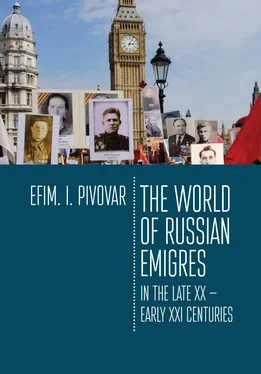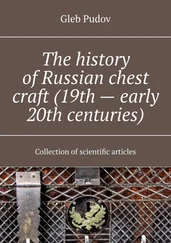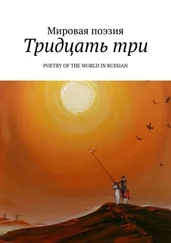Efim Iosifovich Pivovar
The World of Russian emigres in the late XX – early XXI centuries
© E. I. Pivovar, 2021
© “Aletheia” Publishing House (St. Petersburg), 2021
In loving memory of my mother Anna Pivovar, whose path in life was intertwined with the fates of our compatriots abroad, both near and far, in the late 20 th-early 21 stcenturies.
Russian world abroad at the turn of the century (late 20th and early 21st century)
The modern Russian community abroad is an intrinsic part of the shaping multipolar world with its institutional structures in almost all civilization centers of the new world order, i. e. in the European Union, Eurasia, the USA, Asia Pacific, Canada, Latin America, etc. Therefore, the Russian world is deeply involved in the unfolding process of globalization in all areas, i. e. technology, humanities, the information revolution, industrial development, governance, and business. [1] Contribution of Russian compatriots to sciences and culture in foreign countries: collection of writings (2013) Moscow.
At the same time, theory and practice of Russian public policy on the cooperation with the Russian world is also improving and developing. On October 31, 2018, addressing the delegates of the 6 thWorld Congress of Compatriots Living Abroad, President of Russia Mr Vladimir Putin said:
Over 700 people from many countries are attending this Congress. At the same time, all of you together represent the tight-knit community of Russian compatriots and the huge united Russian world, which was never based exclusively on ethnic, national or religious principles. It has brought together and united all those who are connected to Russia spiritually, who feel a spiritual link to our homeland, and who consider themselves to be Russian speakers and the carriers of Russian culture and history.
I would like to express my sincere gratitude to you for your involvement in the life of Russia, for your invariable support and for your solidarity. I would like to express my sincere gratitude to you for your involvement in the life of Russia, for your invariable support and for your solidarity. We are grateful for your contribution to the promotion and advancement of our rich historical and cultural heritage and everything else that constitutes our national Russian identity. [2] Address by the President of the Russian Federation Mr Vladimir Putin to the 6th World Congress of Compatriots Living Abroad. (2018, October 3). Retrieved from http://en.kremlin.ru/events/president/news/59003
A new system of relations between the Russian society, the State, and Russian speaking communities in the near and far abroad developing in the context of ever more complex geopolitical and economic environment resuits in a need for rethinking the nature of the Russian world as a comprehensive phenomenon of the contemporary history and modernity.
The Russian community abroad has played an important part in my life as a historian and university professor. Sometimes, it seems that the study of this problem has already been comprehensive, conclusions have been drawn, but then again there are new facts, documents, topics and new theoretical aspects of the problem. [3] Pivovar, E. (2000). The Russian Abroad in the 19 th and early 20 th century: certain results from the research. Historical notes, No. 3 (121), 237–253; Pivovar, E. (2004) The study of and the academic course on the history of the Russian community abroad in higher education institutions in the 1990s: experience, challenges, future. In Historical science and education at the turn of the century. Moscow;
Historically, the textbook Russian community abroad of the 1920-1930s is closely associated with the destinies of the later waves of Russian and global migration; it has become a part of the common space of the Russian world in the beginning of the 21 stcentury, as well as of my own “professionally intense” historical time that resulted in books, lectures, academic courses and scientific reports. [4] Pivovar, E. (2011). The Russian community abroad in global intellectual environment in the 20th and early 21st centuries. In Advantage of a historian: commemorating the 90th anniversary of the birth of Yuri Polyakov, Academician of the Russian Academy of Sciences (pp. 40–63). ROSSPAN.;
To a great extent, the very phenomenon of the Russian world, still transforming and developing, contributes to that and calls for constant rethinking of its historical nature and modern context.
Naturally, the historical process of reuniting two cultural branches and two temporal streams of the Russian history resulted in the Russian world concept, emerging and shaping in the national humanitarian science and mass media, uniting the past, present and future of Russian diasporas, establishing the state doctrine of the Russian world as social, cultural and economic continuation of Russia on the global level. The Russian emigres of the 20 thcentury “returned to Russia as poems” and in many other ways; they simply have become part of the national humanitarian knowledge. But this very return was both a consequence and a driver of the socio-political and mental transformation of the Russian society in the 1990s – early 2000s. Even today, its influence and presence in the intellectual sphere continues to play its role and to facilitate the development of Russian science and higher education. The cultural-historical phenomenon of the Russian community abroad is not a sensation anymore; this topic simply cannot be fully covered, just like the works of Alexander Pushkin or the history of people’s bravery and heroism in the years of the Great Patriotic War.
At the same time, the culture of the Russian world is not some established backward-looking set of ideas and images; it is an ever-changing reality promoting the basic civilizational values, i. e. new works of art and literature, scientific research, etc. In this context, it seems relevant and important to create a single database on the Russian community abroad. A multi-volume fundamental encyclopedia Russian community abroad in the 18 th– early 21 stcenturies can make a significant contribution to such a project. Certainly, such a publication should be prepared by joint efforts of many scientific teams from the Russian Academy of Sciences, leading national universities, the Alexander Solzhenitsyn House of Russian Abroad, the State Archives of the Russian Federation and other national centres of the Russian emigration studies in cooperation with foreign scientists and Russian compatriots in countries of the far and near abroad.
The Russian world is often perceived in the near abroad as an area of its own that has nothing to do with the so-called textbook Russian community abroad. Indeed, the differences between the two Russian worlds in terms of historical context and social image are quite significant. [5] Post-Soviet space. Policies, economy, culture. (2009). Eurasia: information and analytics bulletin No. 1; Post-Soviet space. The Eurasian idea in the 21 st century: new development vector. (2009). Special issue commemorating the 15 th anniversary of the Eurasian idea in the CIS; etc.
However, it is obvious that on-going globalization processes and parallel geopolitical and socio-economic transformation of the post-Soviet space result in the emergence of new realities throughout the Russian world, changing the conditions for its internal development, as well as for the interaction with Russia and countries of residence; but it also develops its role in the global socio-political and information space.
Russian compatriots abroad have brought to their homeland their experience of global intellectual and cultural dialogue, which has now become even more complex and multifaceted; it includes the interaction between many generations, social and professional groups and far-reaching information flows. In the 20 thcentury, Russian literature, philosophy, and art abroad were one of the essential components within the spiritual and cultural space of many cultures in different regions of the world, having become part of the global intellectual elite. Economic emigres of the late 1980s-1990s changed the qualitative features of Russian-speaking communities in the European Union and the United States for a while. Yet it is now clear that Russia abroad has not lost its importance as a global intellectual and creative resource, while acquiring new positive qualities and opportunities.
Читать дальше












